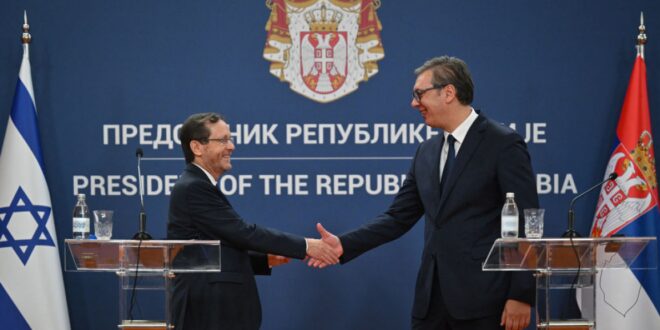Israeli president Isaac Herzog’s first ever visits to Serbia and Albania weeks ago cannot be seen as isolated from the developments in the region, analysts say.
As Tel Aviv charges ahead with multiple wars, undeterred by the unprecedented damage it is bringing itself globally as indicated by some of its staunchest allies cutting down supplies of ammunition, Israel is finding it useful to rekindle bonds with newer allies in the Balkans.
The aim, observers say, is purely strategic, as it contemplates its next step against Iran.
During his September visits, it was reported that Israeli president Isaac Herzog agreed with these states “to deepen bilateral cooperation amid Israel’s extending military campaign against Hamas and Hezbollah in southern Lebanon.”
According to Ahmed Dahshan, a researcher in Russian affairs and Eurasian countries, the visit was to capitalise on “the erosion of Iranian influence in the Balkans, particularly in Bosnia and Herzegovina, and Kosovo, which Tehran had backed against Serbia during the 1990-1991 war.”
“Iran had backed Bosnia and Herzegovina, and Kosovo, against Serbia, but we find, today, that Albania is hosting Mujahedeen e-Khalq, a group that opposes the Iranian regime, and Bosnia has voted against every UN vote condemning Israel,” he explained.
Israel has vowed to respond to Iran firing ballistic rockets at Tel Aviv on 1 October, heightening the prospects of a regional all out war, while the US braces for its own presidential elections in less than two weeks’ time. As US and European officials call on Israel to bring an end to the escalations, Israeli officials are adamant on keeping the war going, for which it seeks support from all potential allies.
Arms and support
As with Israel’s initial drive in May 2010 to bolster ties with the Balkans on the back of deteriorating relations with Turkey following Israel’s deadly attack on the Freedom flotilla which sought to break the siege on Gaza, this current drive is also a calculated one, coinciding with the growing risk of a full-blown war with Iran.
Since then, Israel has fostered its trade, security, technology and surveillance relations with Serbia, Albania, Kosovo, Macedonia, Bulgaria and other countries in the region.
For one thing, Albania is Israel’s third-largest source of fuel oil. According to reports, the Serbian state arms manufacturer Yugoimport-SDPR exported to Israel ammunition worth €7.3 million (about $7.8 million) last July, bringing the value of these exports to €23 million (more than $24 million) this year. Although not among the largest exporters of weapons to Israel, Serbia’s contribution remains significant amidst international calls to stop arms exports to Israel to prevent more civilian deaths in the Gaza Strip.
Khaled Khalil, a Turkey-based researcher on Israeli affairs, says to The New Arab that the goal behind the Israeli president’s visit to Serbia and to its neighbouring Muslim country Albania, which is hostile to Iran, is “to strengthen security relations and partnerships in several areas, most notably: free trade, military cooperation, and arms supplies, while ignoring the Human Rights Council’s call to stop arms sales, and the partial arms sales restrictions imposed by countries allied with Israel, such as Britain, Italy, the Netherlands, and Canada, after the devastating war on Gaza.”
“The factors driving Israel towards developing ties with the Balkans, especially Serbia and Albania, are the international isolation that it faces because of its war against Gaza, which is eroding its existential legitimacy which it derives from the West,” says researcher Khalil, noting that the Balkans have become a political backer in Eastern Europe for Israel against its enemies, and against all efforts in the UN aimed at reviving the two-state solution.
Old roots, newfound interests
According to Skender Perteshi, researcher at Kosovar Center for Security Studies, relations between Israel, Kosovo and Albania aren’t new. In fact, they go back to World War II when these eastern European countries refused to expel Jewish citizens, a gesture which Herzog honoured during his visit.
In modern times, he noted, Kosovo became the first Muslim-majority country to recognise Jerusalem as Israel’s capital, in addition to and bilateral diplomatic ties have strengthened, leading to a 2024 joint decision to lifting of visas for visitors of both countries.
“North Macedonia and Greece have also seen increased cooperation with Israel, particularly in areas such as defence, security and technology,” he added, noting that the recent visits could be seen, among other things, as “Israel’s efforts to create new alliances in the Balkans, as an effort of its own, for influence in the region, and to fight the growing influence of countries such as Russia and Iran.”
This collaboration became evident in 2022, when an Iranian cyberattack on Albania led to the Albanian president immediately reaching out to Israel to enhance security cooperation, especially in the cybersphere.
Antoun Shalhat, a Palestinian expert in Israeli affairs, expects Tel Aviv will be careful not to decline these relations with the Balkans “because it needs the greatest cover to continue the war and commit crimes that pose a challenge to it in the international arena.”
 Eurasia Press & News
Eurasia Press & News




